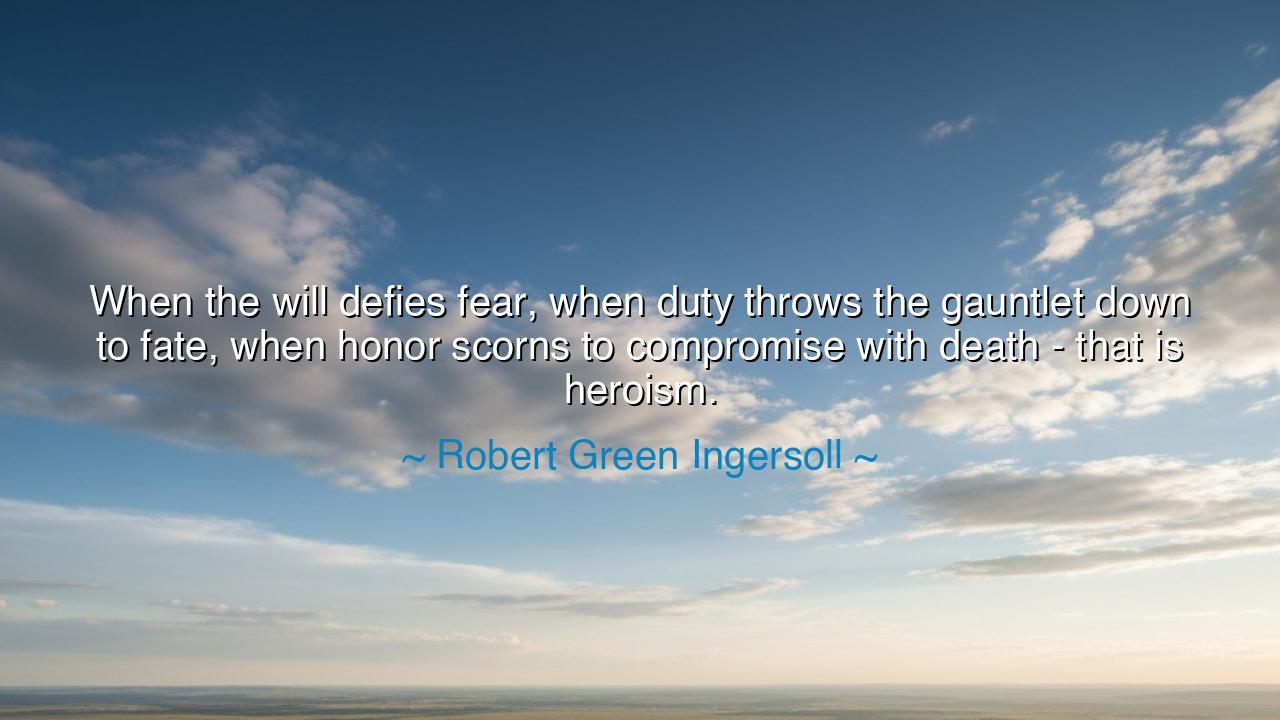
When the will defies fear, when duty throws the gauntlet down to
When the will defies fear, when duty throws the gauntlet down to fate, when honor scorns to compromise with death - that is heroism.






In the resounding and immortal words of Robert Green Ingersoll, the “Great Agnostic” and orator of reason and liberty, there burns the flame of noble defiance: “When the will defies fear, when duty throws the gauntlet down to fate, when honor scorns to compromise with death—that is heroism.” These words, thunderous yet serene, call to the highest part of the human spirit. They speak of the moment when a soul, pressed between life and death, comfort and conscience, chooses the harder road — the road of courage, sacrifice, and truth. For Ingersoll believed that true greatness is not in victory or survival, but in the strength to stand firm when everything trembles.
The origin of this quote comes from Ingersoll’s orations on valor and virtue, written in the late nineteenth century. Ingersoll was no stranger to battle, both literal and moral. He served as a colonel in the Union Army during the American Civil War, fighting for the preservation of freedom and human dignity. Later, he became a defender of secularism, reason, and compassion, often standing alone against the tide of orthodoxy. To him, heroism was not reserved for soldiers or kings; it belonged to every man and woman who dared to face fear, not with blind rage or fanaticism, but with purpose and moral conviction. In these words, he captures the essence of what it means to be truly alive — to confront the inevitable and act not out of hope for reward, but out of loyalty to what is right.
The first pillar of his teaching lies in the phrase, “When the will defies fear.”* Fear is the oldest enemy of mankind. It crouches at the threshold of every great deed, whispering doubt into the heart. But will — the conscious, disciplined resolve of the soul — is what separates the brave from the broken. To defy fear does not mean to feel none, but to rise above it, to act in spite of trembling hands and racing hearts. The ancients understood this well. The philosopher Aristotle said that courage is not the absence of fear, but mastery over it. The hero, then, is not one who feels no terror, but one who commands it — who looks into the face of danger and says, “You shall not rule me.”
The second pillar is duty, the sacred call that binds the individual to something greater than himself. When Ingersoll writes, “When duty throws the gauntlet down to fate,” he summons the image of a warrior challenging the stars themselves. Fate — that mysterious force of circumstance and destiny — often crushes the weak and humbles the proud. But duty, when held with honor, refuses to yield even to the inevitable. Consider Leonidas at Thermopylae, who stood with his three hundred Spartans against the Persian horde. He knew death awaited him, yet his sense of duty to Greece and to freedom made him unafraid. His stand did not save his life, but it saved his people’s spirit for generations to come. That is the courage of one who “throws the gauntlet down to fate.”
The third and final pillar of Ingersoll’s vision is honor — that incorruptible flame that refuses to “compromise with death.” To live without honor, he teaches, is a living death, for the body may breathe while the soul decays. But to uphold honor, even in the face of extinction, is to achieve immortality of the spirit. The samurai of ancient Japan lived by this creed. For them, dishonor was worse than death, for death merely ended the body, but shame destroyed the soul. When a man or woman acts from honor, they become unshakable — for even death loses its sting when faced with a conscience that burns brighter than fear.
Such heroism is not only found on the battlefield. It exists wherever men and women stand against injustice, wherever truth is spoken in the face of lies, wherever compassion is offered despite risk or ridicule. Think of Harriet Tubman, who guided enslaved souls to freedom through perilous nights, carrying neither weapon nor wealth, but a heart fearless in purpose. Her will defied fear, her duty defied fate, her honor defied death — and in her, Ingersoll’s vision of heroism breathes in perfect form. She showed that courage is not confined to war or politics, but lives in every act of love that refuses to bow before evil.
So, my child of tomorrow, take this lesson from Robert Green Ingersoll: heroism is not a gift bestowed at birth, nor a mantle reserved for legends. It is the daily choice to stand when others kneel, to act when others hide, to hold faith when all else fails. Let your will be stronger than your fear; let your duty be higher than your comfort; let your honor be truer than your desire for safety. For though the body may perish, the deed endures. The one who lives thus cannot be conquered by death, for their spirit becomes eternal through the greatness of their courage.
And remember this above all: heroism is not the absence of fear — it is the triumph of purpose over it. When the moment comes for you to choose between comfort and conviction, between silence and truth, between life and honor — choose as the heroes did. Defy fear, challenge fate, and let your honor burn brighter than your fear of the end. For in that moment, you will know, as Ingersoll knew, that to live bravely is the only way to live at all.






AAdministratorAdministrator
Welcome, honored guests. Please leave a comment, we will respond soon